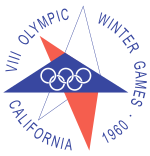1960 Squaw Valley Olympics

The emblem represents a star or snowflake, and the Olympic rings.
|
|||
| Host city | Squaw Valley, California, United States | ||
|---|---|---|---|
| Nations participating | 30 | ||
| Athletes participating | 665 (521 men, 144 women) |
||
| Events | 27 in 4 sports (8 disciplines) | ||
| Opening ceremony | 18 February | ||
| Closing ceremony | 28 February | ||
| Officially opened by | Vice President Richard Nixon | ||
| Athlete's Oath | Carol Heiss | ||
| Olympic Torch | Ken Henry | ||
| Stadium | Blyth Arena | ||
| Winter | |||
|
|||
| Summer | |||
|
|||
The 1960 Winter Olympics, officially known as the VIII Olympic Winter Games, was a winter multi-sport event held between February 18–28, 1960 in Squaw Valley, California, United States. Squaw Valley was chosen to host the Games at the 1956 meeting of the International Olympic Committee (IOC). It was an undeveloped resort in 1955, so from 1956 to 1960 the infrastructure and all of the venues were built at a cost of US$80,000,000. It was designed to be intimate, allowing spectators and competitors to walk to nearly all the venues. Squaw Valley hosted athletes from thirty nations who competed in four sports and twenty-seven events. Women's speed skating and biathlon made their Olympic debuts. The organizers decided the bobsled events did not warrant the cost to build a venue, so for the first and only time bobsled was not on the Winter Olympic program. The Soviet Union dominated the medal count winning twenty-one medals, seven of which were gold. Soviet speed skaters Yevgeny Grishin and Lidiya Skoblikova won two gold medals each. Swedish cross-country skier Sixten Jernberg added a gold and silver to the four medals he won at the 1956 Winter Games.
Cold War politics forced the IOC to debate the participation of China, Taiwan, North Korea and East Germany. In 1957 the United States government threatened to deny visas to athletes from Communist countries. The IOC responded with a threat to revoke Squaw Valley's right to host the 1960 Games. The United States conceded and allowed entry to athletes from Communist countries.
Squaw Valley was a struggling ski resort with minimal facilities, which made its selection to host the 1960 Winter Olympics a surprise. Wayne Poulsen and Alexander Cushing, who were inspired to an Olympic bid by a newspaper article mentioning that Reno, Nevada, and Anchorage, Alaska, had expressed interest in the Games. Poulsen, president of the Squaw Valley Development Company, petitioned California Governor Goodwin Knight to support a bid to host the Olympic Games. Knight's administration agreed and recommended that the California Legislature appropriate $1,000,000 to the effort. Based on the financial support received from the State of California, the United States Olympic Committee (USOC) approved the bid on January 7, 1955. Cushing and the USOC received a resolution passed by the United States Congress and signed by President Dwight Eisenhower, calling on the International Olympic Committee (IOC) to consider Squaw Valley's bid for the 1960 Games. Preliminary reports were drafted and submitted to the IOC, which was considering bids from Innsbruck, Austria, St. Moritz, Switzerland and Chamonix, France. Squaw Valley was provisionally awarded the right to host the Games, but IOC president Avery Brundage warned the Organizing Committee that unless more funds were secured by April 1956, the bid would be awarded to Innsbruck. Another $4,000,000 were committed by the State Legislature, which met Brundage's requirements. On April 4, 1956, the right to host the 1960 Winter Olympics was officially awarded to Squaw Valley. Competitors and officials from European nations were angered by the selection; they felt that the alpine ski courses were not up to specifications and that the altitude would prove too stressful on the athletes.
...
Wikipedia
